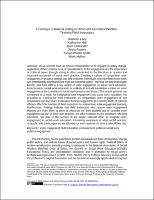Please use this identifier to cite or link to this item:
https://hdl.handle.net/20.500.12202/10055| Title: | Creating a culture of voting in direct and generalist practice: Training field instructors. |
| Authors: | Lane, Shannon Hill, Katharine Ostrander, Jason Powers, Jenna Smith, Tanya Rhodes Hylton, Mary 0000-0002-6337-2712 |
| Keywords: | SOCIAL work education PLURALITY voting STUDENT engagement SOCIAL workers SOCIAL case work BUSINESS success empowerment field education political engagement political social work Voter engagement |
| Issue Date: | 2019 |
| Citation: | Lane, S. R. Hill, K., Ostrander, J., Powers, J., Smith, T. R. & Hylton, M. E. (2019). Creating a culture of voting in direct and generalist practice: Training field instructors. Advances in Social Work, 19(1), 86-105. doi:10.18060/22614 |
| Series/Report no.: | Advances in Social Work;19(1) |
| Abstract: | Social workers have an ethical responsibility to be engaged in policy change, regardless of their practice area or specialization. Voter engagement and the importance of political power through voting is often overlooked in the literature as a valid and important component of social work practice. Creating a culture of nonpartisan voter engagement in practice settings can help empower individuals who have been historically and intentionally disenfranchised from our electoral system. Training for field instructors, faculty, and field staff is a key aspect of voter engagement in social work education. Unfortunately, social work education is unlikely to include substantive content on voter engagement or its connection to social work practice and impact. This article presents one component of a model for integrating voter engagement into social work education: the provision of training for field instructors on nonpartisan voter engagement at two universities over two years. Evaluation findings suggest that pre-existing levels of political efficacy affect the reaction of field instructors to nonpartisan voter engagement training. Furthermore, findings indicate that field instructors who receive voter engagement training are more likely to serve as resources for their students and to consider voter engagement as part of their own practice. We offer evidence on the important role field educators can play in the success of the larger national effort to integrate voter engagement in social work education. Increasing awareness of what social workers, nonprofit, and public agencies are allowed--or even required--to do is a critical first step. [ABSTRACT FROM AUTHOR] Copyright of Advances in Social Work is the property of University-Purdue University Fort Wayne and its content may not be copied or emailed to multiple sites or posted to a listserv without the copyright holder's express written permission. However, users may print, download, or email articles for individual use. This abstract may be abridged. No warranty is given about the accuracy of the copy. Users should refer to the original published version of the material for the full abstract. (Copyright applies to all Abstracts.) |
| Description: | Scholarly article / Open access |
| URI: | https://hdl.handle.net/20.500.12202/10055 |
| ISSN: | ISSN: 1527-8565 eISSN: 2331-4125 |
| Appears in Collections: | Wurzweiler School of Social Work: Faculty publications |
Files in This Item:
| File | Description | Size | Format | |
|---|---|---|---|---|
| _Lane_et_al_22614_2019 OA Creating_a_Culture.pdf | 200.39 kB | Adobe PDF |  View/Open |
This item is licensed under a Creative Commons License

